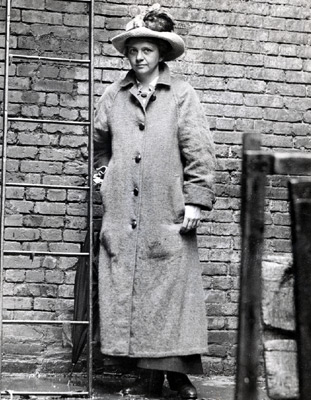Show students the picture below. You might ask if anyone wants to hazard a guess about what this woman’s job is. What is she doing?
This woman is investigating a deadly fire. Her name is Frances Perkins, the year is 1911, and she is standing at the site of the Triangle Shirtwaist Factory in Greenwich Village in New York City. On March 25, 1911, a fire at the factory killed 146 garment workers - mostly young immigrant women. Many jumped out the windows of the building to their deaths because the employer had locked the doors.
Frances Perkins led a team of investigators who uncovered the extreme employer negligence that led to the fire and the deaths. The investigation eventually led New York State to adopt the most comprehensive workplace health and safety law in the nation at that time.
Twenty-two years later, in 1933, President Franklin Roosevelt begged Frances Perkins to become his secretary of labor.
Perkins said she would not take the job unless her conditions were met: She was only interested in being labor secretary if Roosevelt would back her up on all of the policies she intended to fight for. They were:
- a 40-hour work week
- a federal minimum wage
- unemployment compensation
- worker’s compensation (for workers injured on the job)
- abolition of child labor
- federal aid to the states for unemployment relief
- Social Security (support for seniors)
- a revitalized federal employment service
- universal health insurance
Roosevelt said he endorsed them all. So Perkins took the job, becoming the first woman cabinet member in U.S. history. Roosevelt subsequently got a lot of hate mail from people saying a woman could not do this important job.
Perkins was one of only two cabinet members to stay the entire length of Roosevelt’s presidency. By the end of those 12 years, Frances Perkins with the help of many thousands of activists and organizations across the countrysucceeded in winning all her demands except one, universal health insurance.
Toward the end of her life, Perkins said: "There is much to be done ...It is up to you to contribute some small part to a program of human betterment for all time."
Activity
Ask students to name one change THEY would demand if they were in Frances Perkins' position today. Give students a minute or two to think about it, and then have students respond in a go-round.
Sources:
http://francesperkinscenter.org/?page_id=574
http://www.fdrlibrary.marist.edu/aboutfdr/perkins.html
Woman Behind the New Deal by Kirsten Downey: http://www.powells.com/biblio/17-9781400078561-0